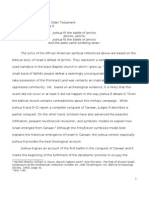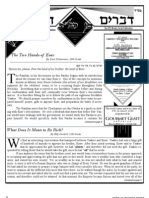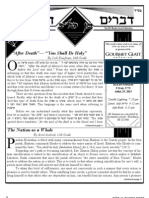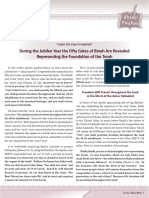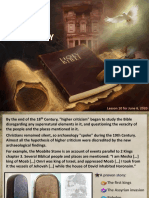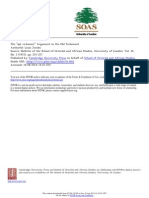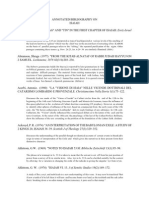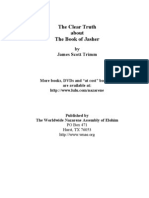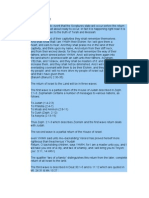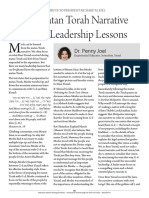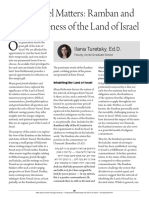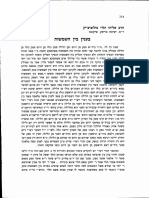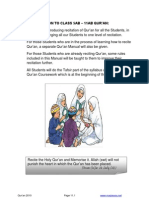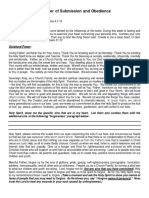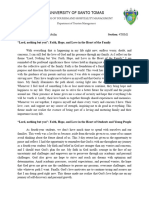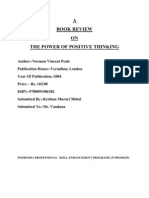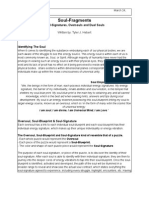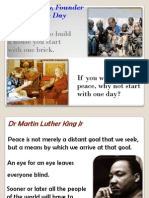The Eulogy For Yoshiyahu Hamelech: Insights Into Kinah 11
The Eulogy For Yoshiyahu Hamelech: Insights Into Kinah 11
Uploaded by
outdash2Copyright:
Available Formats
The Eulogy For Yoshiyahu Hamelech: Insights Into Kinah 11
The Eulogy For Yoshiyahu Hamelech: Insights Into Kinah 11
Uploaded by
outdash2Original Title
Copyright
Available Formats
Share this document
Did you find this document useful?
Is this content inappropriate?
Copyright:
Available Formats
The Eulogy For Yoshiyahu Hamelech: Insights Into Kinah 11
The Eulogy For Yoshiyahu Hamelech: Insights Into Kinah 11
Uploaded by
outdash2Copyright:
Available Formats
Insights into Kinah 11:
The Eulogy for Yoshiyahu HaMelech
f the myriad Tisha BAv
Kinnos recited by Ashkenazic
Jewry, the dirge devoted to
the tragic, untimely death of King
Yoshiyahu (no. 11 in most editions
of Ashkenazi Kinnos) is especially
poignant. This kinnah, like many of
the others, was composed by R. Elazar
HaKalir, whose name is synonymous
with the genre of Ashkenazi piyut
(poetic liturgical compositions).
While the identity of HaKalir and
the time period in which he lived are
the subject of much discussion and
debate,1 the high regard with which he
and his compositions have long been
held are undeniable.2
R. Elazar HaKalirskinnosgenerally
follow analeph-beisacrostic
or a permutation of thealephbeis(reversealeph-beisoratbash),
and are based on the language of one
or more perakim in Tanach. Often his
name, Elazar, is encoded as an acrostic
at the conclusion of the composition.
The literary structure of kinnah no. 11
is patterned after the fourth chapter
of Eicha, with each stanza beginning
with the corresponding opening word
of apasukin this chapter.3 Chazal
(quoted by Rashi to Eicha) interpret
the fourth chapter of Eicha as a
eulogy for King Yoshiyahu. Yoshiyahu
inherited the throne from his father,
Amon, and his grandfather, Menashe,
both of whom led the Jewish people
down a path of spiritual depravity.
Yoshiyahu ascended the throne at the
age of 8 and ruled for 31 years. During
Rabbi Elchanan Adler
Rosh Yeshiva, RIETS
his reign, he set the Jewish people
back on the path of Torah, cleansed
the Beis HaMikdash and rid the Land
of idolatry. Yoshiyahu was tragically
killed in battle when he tried to stop
Pharaoh Necho, King of Egypt, from
passing through Eretz Yisrael in
order to reach the Euphrates to wage
war. Thepasukin Divrei HaYamim
(2, 35:25) records that Yirmiyahu
composed a kinnah upon the tragedy
of Yoshiyahus death. Tradition
teaches that this kinnah is the fourth
chapter of Eicha.
The Gemara (Taanis22b) relates
that Yoshiyahu was punished for
not consulting with Yirmiyahu
about whether to wage battle against
Pharaoh Necho. Midrashic sources
indicate that Yoshiyahu disregarded a
warning issued to him by Yirmiyahu
not to block Pharaoh Nechos entry
into the land (see later discussion).
Yoshiyahus reasoning was based on
the biblical assurance that a sword
shall not pass through your land
(Vayikra 26:6), which Yoshiyahu
interpreted as referring even to a
sword of peace (i.e. an army that
doesnt plan on waging war with
Israel). The Gemara (ibid) explains
that Yoshiyahu erred in overestimating
the righteousness of his people and
thinking that they were worthy of
this blessing.4 The Midrash (Eicha
Rabbah1:57), provides further
detail: Yoshiyahu assumed that he
had successfully eradicated idolatry
from all Jewish homes after having
sent messengers to inspect each
home. However, unbeknown to
the inspectors, there were some
duplicitous people who stealthily
placed half an idol on each side of the
door so that when the doors would
open, the idols could not be seen but
once closed, the idols became visible
again.
Each line of this kinnah is replete
with myriad scriptural and midrashic
allusions. A close analysis of these
connections yields many precious
insights. Unfortunately, space
constraints do not allow us to focus on
the kinnah in its entirety, but only on
several key sentences.5
Cry out Eicha for one of the
mighty ones
The shoresh (root) of the word eilav
would seem to be eil, which means
mighty, just as we find in the word
Rabbi Isaac Elchanan Theological Seminary The Benjamin and Rose Berger CJF Torah To-Go Series Tisha Bav 5776
baeilim (Shemos 16:11), which Rashi
translates as bachazakim, among the
mighty. Accordingly, this sentence
would be rendered Cry out Eicha for
one of the mighty ones namely,
King Yoshiyahu. Alternatively, one
of the mighty ones may refer to the
extraordinary individual who recited
Eicha for Yoshiyahu namely,
Yimriyahu. If so, the phrase should be
rendered A cry of Eicha came from
one of the mighty ones.
An entirely different interpretation of
this sentence appears in a 16th-century
commentary on the Kinnos authored
by R. Yosef ben Asher, which notes a
verse in Yechezkel (41:1) that refers
to doorposts as eilim(seeMetzudas
Dovid there). As such, the kinnah
implores us to cry out for the sin
of idolatry that was performed by
suspending idols on the doorposts
of the homes (as referenced in the
introduction).
It is noteworthy that R. Elazar
HaKalir utilizes the rootaleph
lamedtwice in this line, once with
the wordeli, which means to cry,
and once withmeelav, which, as
noted, means either mighty or
doorposts. [Interestingly, the aleph
lamed combination appears in the
next sentence as well.] Perhaps the
recurrent use of thealeph lamedroot
is an allusion to the 31 years that
Yoshiyahu reigned (Divrei Hayamim
II 34:1), which corresponds to the
numeric value (gematria) of the letters
aleph lamed (1 + 30).
the midrash (Bamidbar Rabbah,
Chukas no. 19), includes Avraham
At the age of eight he began
and Yoshiyahu in a list of personalities
to inquire about his G-d
and paradigms that defy the trend
The simple reading of this sentence
embodied by their respective
implies that Yoshiyahu began
precursors. The midrash hails this
his spiritual quest when he was
phenomenon as a remarkable
8 years old, the year he became
manifestation of the all-encompassing
king. However, the verse in Divrei
unity of the Master of the Universe:
Hayamim (2, 34:3) indicates
," ( )
otherwise:
, ,
...
.
That which the verse states Who can
. produce purity out of impurity? No one!
In the eighth year of his reign, while
For example: Avraham from Terach,
he was yet young, he began to seek out
Chizkiyah from Achaz, Yoshiyahu from
the G-d of David his father; and in the
Amon the World to Come from this
twelfth year he began to purge Judah
world. Who did this? Who commanded
and Jerusalem of the high places, and the this? Who decreed this? [It was] none
Asherim, and the graven images, and the other than the one and only [Creator] of
molten images.
the World.
6
This pasuk suggests that Yoshiyahus
quest for G-d did not begin until the
eighth year of his reign, rather than the
eighth year of his life (when he first
became king).
Yoshiyahus youthful stirrings to
abandon the idolatrous lifestyle
within which he was reared, laid
the groundwork for his subsequent
campaign to purge idolatry from
the land. Interestingly, Yoshiyahus
Interestingly, Radak translates the
calling, along with his very name, were
verse as In the eighth year of his life,
foreshadowed many years earlier in an
when he started to rule, while he was
episode recorded in Sefer Melachim
yet young, he began to seek etc.7
Ostensibly, Rav Elazar HaKalir follows (1, 13:1-2), in which a prophet of
Hashem appeared to the wicked King
this translation.8
Yeravam as he prepared to offer an
Yoshiyahu was not the first person to
idolatrous sacrifice upon the altar in
recognize G-d in his youth. Chazal
Beis El:
have a tradition that Avraham Avinu
'
also recognized G-d at a young age.
'
Like Avraham, Yoshiyahu was the
son of an idol worshipper. Indeed,
:
Rabbi Isaac Elchanan Theological Seminary The Benjamin and Rose Berger CJF Torah To-Go Series Tisha Bav 5776
He called out to the altar, by the word of
Hashem, and said: Altar, altar! Thus
said Hashem: Behold a son will be born
to the house of David Yoshiyahu will
be his name and he will slaughter
upon you the priests of the high places,
who burn sacrifices upon you; human
bones will be burnt upon you.
Meiri writes:
.
The judges of Israel, its scholars and
This episode suggests that on
its leaders, must constantly probe and
some mystical level Yoshiyahu was
investigate the deeds of the people of their
predisposed from birth toward what
city. They are not free from guilt if they
was to become his lifes mission and
merely acted appropriately regarding
ultimate legacy.9
issues that are well-known and which
make their way to them; they must
proactively probe and spy out the
private deeds to their utmost ability, and
The sin of the generations
those who are delinquent in doing so
scoffers clung to him, those
who set up [the idols] behind are punished for the private deeds of the
sinners because all of Israel have become
the doors
guarantors for one another.
Rabbeinu Yonah (in his commentary
The worddavak, clung, alludes to
to Sanhedrin) writes:
the notion ofareivus, that each Jew
is responsible for the sinful actions
of other Jews. Why was Yoshiyahu
.
punished? How was Yoshiyahu
Because it is impossible that they will not
supposed to know that some
notice some fault when the sinners sin
people were worshipping idols in a
clandestinely.
clandestine manner? R. Soloveitchik
By his choice of the worddavak,
answered that as a leader, Yoshiyahu
R. Elazar HaKalir is providing a
was indeed expected to know his
people (The Lord is Righteous in All His profound insight into the concept
Wayspg. 280, see also commentary in ofareivus. The punishment is not
merely a technical violation for not
Mesoret HaRav Kinot).
investigating the private matters of
We might expand on this insight
the people. It is a natural consequence
by examining more closely the
that flows from failed leadership. A
concept ofareivus. The Gemara
leader must have his pulse on the
(Sanhedrin43b-44a) quotes a dispute conduct of his people. Even when
among the Tannaim as to whether
not initially privy to their specific
there is punishment for the hidden
deeds, he must do all within his
sins of others (nistaros). R. Yehudas
power to probe the intensity of their
opinion is that punishment is, in fact,
commitment. Otherwise, their sins
meted out for hidden sins. Rashi
will automatically cling to him.10
explains that this is primarily directed
toward the leaders. According to R.
Yehuda, the leaders are responsible for
He did not listen to the
the hidden sins of others.
prophet to turn back
7
This sentence, as well as subsequent
sentences in the kinnah, suggest that
Yirmiyahu had advised Yoshiyahu
not to engage in battle with Pharaoh
Necho, and Yoshiyahu chose to defy
these clear instructions. A number
of questions present themselves.
First, in what manner did the navi
(Yirmiyahu) warn Yoshiyahu not to
deny passage to Pharaoh Necho in
person or via an emissary? Second, at
what point was the warning issued
before Yoshiyahu amassed his troops
or afterwards? Third, was Yirmiyahus
warning based on an actual prophecy
that he had received from Hashem?
Fourth, if so, how could Yoshiyahu
justify disregarding it?
A cursory reading of the pesukim
in Divrei Hayamim suggests that
Yirmiyahus message was delivered
by Pharaoh Necho as the word of
Hashem after Yoshiyahu had already
amassed his soldiers for battle.
Additionally, the phrase lashuv
achorayim to turn around
employed by R. Elazar HaKalir,
implies that the prophets warning was
issued after Yoshiyahu had set out to
confront the forces of Pharaoh Necho.
This too would suggest that the
warning was issued via a third party.
Had Yirmiyahu delivered the message
to Yoshiyahu in person, logic would
dictate that such a conversation take
place before Yoshiyahu went out to
war rather than on the battlefield.
The basis for Yoshiyahus disregarding
the prophets warning would also
seemingly hinge on the above issue.
Assuming that the message was
delivered merely by Pharaoh Necho,
Yoshiyahu might have had good
reason to doubt that Pharaoh Necho
was honestly conveying a message
from the prophet. If, however,
the warning came directly from
Rabbi Isaac Elchanan Theological Seminary The Benjamin and Rose Berger CJF Torah To-Go Series Tisha Bav 5776
Yirmiyahu, it is difficult to understand
why Yoshiyahu felt justified in
ignoring it. All of this would suggest
that the Navis message was delivered
to Yoshiyahu at the battlefield via
proxy, most likely by none other than
Pharaon Necho.
This approach is supported by the
comments of Radak (Melachim 2,
23:29) who states:
"
.
Yoshiyahu was punished because he
did not listen to him [Pharaoh Necho]
because he was telling it to him in the
name of Hashem. Our Rabbis say that
when it states [from the word of] Elokim
it refers to the Divine.
However, the midrash (Eicha Rabbah
1:57) records a face-to-face encounter
between Yirmiyahu and Yoshiyahu:
( ")
"
( ")
.
[The verse states] Yoshiyahu didnt
turn his focus away and did not listen
to the words of Necho in the name of
God. This refers to Yirmiyahu who
said to Yoshiyahu, I have received from
Yeshayah, my teacher: I will confound
Egypt with Egypt (i.e. you should
let them fight their own wars without
intervening). Yoshiyahu responded,
Didnt Moshe, the teacher of your
teacher, state a sword shall not pass
through your land, and I shall allow
the sword of this evil person to pass
through my land in my borders?
The midrash records a verbal
exchange between Yirmiyahu and
Yoshiyahu regarding whether to
deny access to Pharaoh Necho. In
support of his position, Yirmiyahu
invoked a prophecy of Yeshayahu
which implied that Israel stay above
the fray as Egypt battles Egypt. The
next line in the kinnah also references
this prophecy of Yeshayahu. If a
direct conversation was held, then
apparently Yirmiyahu visited the
battlefield to convince Yoshiyahu
to reverse course. Alternatively, it is
conceivable that Yirmiyahu issued
an initial warning in person prior to
Yoshiyahus amassing his troops, and a
subsequent warning via proxy calling
on Yoshiyahu to turn back from the
battlefield.
was conveyed via Pharaoh Necho (see
above), the plural they may refer to
Yirmiyahu and Pharaoh Necho.12
As he approached the
battlefront, no bandage was
available, and the archers
shot at King Yoshiyah
The presentation of these events
seems out of sequence. Seemingly,
after Yoshiyahu was shot it was
determined that no bandage was
available. Why does R. Elazar HaKalir
reverse the order of events?13
A simple solution is to read the
sentence in reverse: no bandage was
As to why Yoshiyahu disobeyed
available after the archers shot. On a
the words of the prophet, perhaps
deeper level, however, we may resolve
Yoshiyahu felt that the warning was
this literary anomaly in light of the
not based on a received prophecy
Talmudic teaching (Megillah 13b) that
but merely on logical inferences
Hashem first creates the remedy and
that Yirmiyahu drew from the
afterwards inflicts the wound. In other
aforementioned prophecy of
words, Hashem normally doesnt
11
Yeshayahu. To this, Yoshiyahu
bring suffering upon His people
provided a logical counterargument
unless He has already set into motion
(as recorded in the midrash), and
the process of the cure. R. Elazar
persevered in his military campaign
HaKalir alludes here to the fact that
against the forces of Pharaoh Necho.
this special Divine quality was absent
in Yoshiyahus case; hence, there was
no prepared remedy in place before
the archers shot at Yoshiyahu.
They warned turn back
before the disaster
...
The kinnah uses plural language
'
they warned. What is meant by
The light-footed bent behind
they? As we have seen, the warning
him to hear [the words]
seemingly came from only one
emanating from his mouth
prophet namely, Yirmiyahu.
Hashem is the righteous one
for I have disobeyed His word
We may suggest that because
Yirmiyahu attributed his warning to
This line of the kinnah is based on
a tradition received from Yeshayahu,
the verse (Eicha 1:18), Tzaddik hu
it is as if both he and Yeshayahu had
Hashem ki fihu marisi Hashem is
issued the warning. Alternatively,
just for I have rebelled against His
assuming that Yirmiyahus message
word. The midrash (Eicha Rabbah
8
Rabbi Isaac Elchanan Theological Seminary The Benjamin and Rose Berger CJF Torah To-Go Series Tisha Bav 5776
1:53) and the Gemara (Taanis 22b)
both note that Yirmiyahu overheard
Yoshiyahu uttering these words of
confession just before his death. Yet
there is a notable difference between
the presentation of the midrash and
that of the Gemara. The midrash states
the following:
not.
And he lamented for him all
of Alas, the gold is dimmed
R. Elazar HaKalir alludes here to the
fact that when Yoshiyahu was killed,
Yirmiyahu composed the fourth
' chapter of Eicha Eicha yuam zahav
.( Alas, the gold is dimmed) in
eulogical tribute. The kinnah implies
Yirmiyahu was listening from behind
that the entire fourth chapter of Eicha
to know what he would say. What was
serves as a eulogy for Yoshiyahu. Yet
he saying? Hashem is just for I have
when one examines the specific verses
rebelled against His word and the word
in the chapter, there are only a few
of His messenger.
scattered references to Yoshiyahu;
The Gemara states:
most of it concerns the churban in
general.
" An answer may be gleaned by
examining the verse in Divrei
) , ( Hayamim (2, 35:25) which implies
. ' that Yirmiyahus eulogizing Yoshiyahu
As Yoshiyahu was dying, Yirmiyahu saw set a precedent for future generations:
that his lips were moving. [Yirmiyahu]
said, Maybe G-d forbid, he might say
something inappropriate because of
his suffering. He bent over and heard
.
[Yoshiyahu] accepting his judgment
Yirmiyahu lamented over Yoshiyahu;
saying: Hashem is just for I have
and all the men and women singers
rebelled against His word.
spoke of Yoshiyahu in their lamentations,
Why does the midrash add the words until this day; and they made them an
and the word of His messenger
ordinance in Israel; and, behold, they are
while the Gemara omits it? Perhaps
written in the lamentations.
the variance can be traced to what
What was the ordinance that was
we have noted earlier regarding the
instituted? Rashi writes:
nature of Yoshiyahus sin. According
to the midrash, Yoshiyahu disobeyed
the clear instructions of Yirmiyahu
who had warned him not to wage
battle against Pharaoh Necho.
According to the Gemara, however,
.
Yoshiyahu never received a warning
When the Jewish people experience any
from Yirmiyahu. His sin was that he
form of suffering or grief that causes
rebelled against Hashem by failing
them to lament and cry over that event,
to consult with the prophet. As such,
they will mention this tragedy (i.e. the
the midrash adds and the word of his death of Yoshiyahu) along with it. As
messenger while the Gemara does
an example, on Tisha BAv, when we
9
Rabbi Joseph B.
Soloveitchik ztl on
R. Elazar HaKalir
and his Piyyutim
Kalir was the avi ha-paytaniim,
the father of all liturgical poets;
he dared to do more than any
other paytan. He simply had the
Hebrew language at his disposal,
and he fashioned and refashioned
it, cast and recast its words. That
is why the text is very difficult,
although most of the words
he introduced are still in use.
There are times when he writes
so obscurely that it is almost
impossible to decode what he
means. Those who do not know
either Hebrew or aggadot Hazal
find ha-Kalirs piyyutim boring. But
they are not boring at all; they are
like a gold mine. (pp. 142-143)
The Hakhmei Yisrael chose
the kinot of Kalir for the
very important purpose of
commemorating hurban
Yerushalayim because they
trusted that he would not change
any halakhic practices and that
his kinot would be exactly in
accordance with their traditions.
The trusted him, and he wrote
his kinot under their supervision.
(pg. 139)
On Tishah beAv day, we study
Mishnah, Gemara, and Midrash,
all in the form of kinot written by
great scholars like Rabbi Elazar haKalir. On Tishah beAv day, Kalir is
the commentator, the meturgaman
par excellence, who interprets
Eikhah in halakhic, midrashic and
aggadic terms. (pg. 99)
from The Lord is Righteous in All His Ways
Rabbi Isaac Elchanan Theological Seminary The Benjamin and Rose Berger CJF Torah To-Go Series Tisha Bav 5776
mention those who were killed during the
persecutions that occurred in our times,
we cry over the death of Yoshiyahu as
well.
Rashis comments indicate that a
precedent was established to include
mention of Yoshiyahus death in
connection with mourning over
other national tragedies. As such, the
fourth chapter of Eicha would serve
as a perfect illustration of this very
institution. While the majority of the
chapter does not directly bemoan the
death of Yoshiyahu, the references
at the beginning and end of the
chapter serve to place the tragedy of
Yoshiyahus death within the larger
context of mourning the churban,
precisely because Yoshiyahus death
serves as the quintessential paradigm
of Jewish tragedy.
The innocent one14
experienced the same event
by drinking the cup (of
suffering) at Meggido.
This line is a reference to a midrash
(Vayikra Rabbah, Acharei Mos no.
20) that notes the bitter irony that
the righteous Yoshiyahu, who was
killed by archers in the battlefield (of
Megiddo), suffered the same fate as
the wicked King Achav who was also
slain by archers on the battlefield.15 In
a similar vein, the Gemara (Megillah
3a, Moed Katan 28b) equates the
mass eulogy of Yoshiyahu to that of
Achav. Maharsha (Moed Katan 28b)
notes that both of these eulogies
are associated with battles in which
Why does the kinnah end with this
thought? This sentence highlights
the flawed mindset that prevailed at
that time. Yoshiyahu was convinced
that the spiritual damage that had
On a mystical level, the common
been caused by his predecessors
circumstances surrounding the
had been successfully undone, that
respective deaths of Yoshiyahu
the Jews were righteous and that
and Achav reflect a kabbalistic
the churban would be averted. In
tradition that Yoshiyahus soul was a
addition, many Jews turned a blind
reincarnation of that of King Achav.
eye to Yirmiyahus prophecies of
Hence, Yoshiyahus unique calling
impending doom and sought solace
in life was to rid the land of idolatry,
thereby remedying the sins of Achav in the false hopes offered by charlatan
prophets. However, the sad reality
who was responsible for spreading
was that notwithstanding Yoshiyahus
idolatry in the Land of Israel. 17
herculean efforts and amazing success
in elevating Israels spiritual level,
the damage was irreversible and the
Because they eulogized him
churban was inevitable. Moreover,
with the 22 letters of Eicha
pockets of idolatry still existed
throughout the land, as evidenced
This line refers to the fact that the
by the scoffers who set up idols
fourth chapter of Eicha serves as a
behind the doors (see commentary
eulogy for Yoshiyahu. This reinforces
above). Yoshiyahus death serves as a
the idea mentioned earlier that
lesson to future generations never to
although only a few verses directly
be complacent with the status quo.
refer to Yoshiyahu, the entire chapter
Perhaps this is also why Yoshiyahus
is considered a eulogical tribute given
death has become an integral part of
that Yoshiyahus death is interwoven
Kinnos for all generations.
within the description of national
tragedy.
Notes
The sentence emphasizes that
because Yoshiyahu was eulogized
1 Many Rishonim assume that R. Elazar
appropriately (with recourse to the 22 HaKalir was a Tanna. Tosafos (Chagigah13a,
letters of the aleph beis in chapter 4 of
s.v. Vraglei) and the Rosh (Berachos chapter
Eicha), the churban was postponed for 5 #21) assume that he was R. Elazar the son
of R. Shimon bar Yochai. [See, however,
22 years.18
only the king was killed, giving each
tragedy the appellation of an eivel
yachid the mourning over a single
charismatic leader.16
I thought that He would
forever shelter me
Mor Uketziah (OC 112) who quotes the
Arizal as attesting that HaKalir contained
the spark of the soul (nitzotz nishmas) of
R. Elazar b. Shimon. See also the Chidas
Machzik Bracha, ibid.] According to the
Rashba (Teshuvos Harashba1:469), he was
R. Elazar ben Arach. Others consider the
Find more shiurim and articles from Rabbi Elchanan Adler at
http://www.yutorah.org/Rabbi-Elchanan-Adler
10
Rabbi Isaac Elchanan Theological Seminary The Benjamin and Rose Berger CJF Torah To-Go Series Tisha Bav 5776
possibility that HaKalir was R. Elazar b.
Yaakov or R. Eliezer b. Hurkinus (Tzemach
Dovid, 4: 833). On the other hand, Rav Yosef
Steinhart (Zichron Yosef, Orach Chaim, no.
13), speculates based on the language of some
of HaKalirs piyyutim, that he lived in the
Geonic period. This view was also held by
R. Wolf Heidenheim and R. Shlomo Yehuda
Rappaport (Shir). [See, however, a critique of
this opinion in Noda BiYehuda (Orach Chaim
2, #113).] See also lengthy discussion in
Shut Teshuva Meahava by R. Elazar Fleckeles
(Orach Chaim 1:1). Most contemporary
scholars place him within the Byzantine
period (early 7th century).
refer to http://www.yutorah.org/lectures/
lecture.cfm/780541/rabbi-elchanan-adler/
analyzing-kina-11-the-tragic-death-ofyoshiyau-hamelech/
2 HaKalirs compositions are often cited
and discussed by Rashi, Tosafos and many
Rishonim. For a sample listing, see Shut
Teshuva Meahava ibid. For an eloquent
defense of HaKalirs intricate linguistic style,
and the genre of piyut in general, see Nesivos
Olam (Maharal of Prague), Nesiv HaAvodah,
# 12.
8 Some suggest a more homiletical
interpretation: once ascending the throne
Yoshiyahu was, in a sense, reborn. Hence,
the eighth year of his reign is considered the
eighth year of his new life.
3 In one instance (stanza beginning with the
words Vayigdal avon), HaKalir utilizes the
opening two words of the verse.
6 Some versions have meelav of his own
[accord], highlighting the fact that Yoshiyahus
spiritual quest occurred without his having
recourse to a mentor or teacher.
7 Radak may have been led to this
interpretation by the syntax of the verse:
uvishmoneh shanim lmalcho. Had the pasuk
meant In the eighth year of his reign,
it should have stated uvishnas shmoneh
lmalcho.
9 For an elaboration of this idea, see Pirkei
deRebbi Eliezer chapters 17 and 32, and the
comments of R. Eliyahu Haitamari referenced
in note 17.
4 The Artscroll commentary to Kinnos adds:
He ignored the prophets harsh warning and
instead sought advice from the prophetess
Huldah whom he felt would see things in
a more sympathetic light. This sentence
is factually misleading. In fact, the advice
that Yoshiyahu sought from the Prophetess
Chuldah occurred years earlier in the wake
of a discovery of an ancient Torah Scroll,
which was open to an ominous verse within
the tochacha, and bears no connection to
Yoshiyahus confronting Pharaoh Necho
in the battlefield against the wishes of
Yirmiyahu. The pairing of the two events is a
glaring error which will hopefully be deleted
in future editions.
10 Additionally, the word davak may allude
to the concept of vicarious atonement
namely, that Yoshiyahu died on account of the
sins of the generation and his death atoned for
the generations sins in a manner similar to the
offering of a korban. This notion is implicit
in a midrashic interpretation cited by Pirkei
deRebbi Eliezer (chapter 17) on the pasuk
(Yeshayau 57:1) Tzadik avad . . . beein meivin
ki mipnei haraah neesaf hatzadik, which
the commentaries note refers to the death of
Yoshiyahu. [See, however, Rashi (ibid) who
interprets mipnei haraah neesaf hatzadik in a
different manner.] The equating of Yoshiyahu
with the status of a communal offering is also
noted by R. Soloveitchik (See Mesoret HaRav
Kinot, P. 297). This concept deserves greater
elucidation.
5 The insights presented here are culled from
a lengthy pre-Tisha BAv shiur which dealt
with the entire kinnah. For those interested,
the shiur can be heard on YUTorah, please
11 Indeed, the language of the midrash speaks
of Yirmiyahus referring to a tradition that
he received from my mentor Yeshayahu
(Yeshayahu Rabi), implying that the matter
11
was a function of rabbinic interpretation
rather than of received prophecy.
12 The same question can be raised with
regard to the next words of the kinnah:
vayimaanu sur And they refused to turn
back. To whom does they refer? Perhaps it
is a reference to Yoshiyahu and the soldiers
who had amassed for battle.
13 Some versions of the kinnah substitute the
word sheiyah, prayer, for retiyah, bandage. As
such, the sentence reads well and states that
Yoshiyahus prayers on the battlefield were not
accepted.
14 An alternative rendition might be He was
depleted through experiencing the same event
etc.
15 The midrashic observation is based on
a verse in Koheles (9:2), which speaks of
mikreh echad (an identical fate) that befall
the righteous as well as the wicked. Hence, R.
Elazars HaKalirs use of the phrase bemikreh
echad.
16 The assumption that Yoshiyau was the sole
casualty of the battle is seemingly inconsistent
with an earlier line of the kinnah, Kilah
hamonai leches Aram Nahrayim, which the
commentaries render as He [Yoshiyahu]
destroyed my multitudes [of Jewish soldiers]
by going forth [in battle] toward Aram
Naharyim (see Goldschmidt edition of
Kinnos as well as Kinnos HaMeforash).
Other commentaries, however, interpret
this as referring to Yoshiyahus blocking
the multitudes of Egyptian soldiers from
passing through Israel to reach the Euphrates
(see Peirush Kadmon as well as Artscroll).
According to this interpretation, Maharshas
assumption remains tenable.
17 See Velo Od Ela (by R. Eliyahu
Haitamari, author of Shevet Musar), in the
section on Pirkei deRebbi Eliezer, chapter 17.
18 For a beautiful explanation of the
significance of the eulogys being based on
the 22 letters of the Hebrew alphabet, see the
commentary in the Mesoret HaRav Kinnot.
Rabbi Isaac Elchanan Theological Seminary The Benjamin and Rose Berger CJF Torah To-Go Series Tisha Bav 5776
You might also like
- Obscure Religious Cults by Shashibhushan DasguptaDocument560 pagesObscure Religious Cults by Shashibhushan DasguptaBibek Bhattacharya100% (1)
- Biblical Worldview PaperDocument6 pagesBiblical Worldview PaperragcajunNo ratings yet
- Exegetical Paper On Joshua 6Document5 pagesExegetical Paper On Joshua 6Pamela Y. Cook100% (1)
- Who Is Edom PDFDocument71 pagesWho Is Edom PDFrbrandonray100% (4)
- Lessons Learned From Conversion: Rabbi Zvi RommDocument5 pagesLessons Learned From Conversion: Rabbi Zvi Rommoutdash2No ratings yet
- Testament of The Baal Shem Tov 1 PDFDocument217 pagesTestament of The Baal Shem Tov 1 PDFjasongroom100% (7)
- Amor Propio FilipinoDocument19 pagesAmor Propio FilipinoAna Enclonar100% (1)
- Memorial Book - Emmanuel Yehuda MorenoDocument37 pagesMemorial Book - Emmanuel Yehuda Morenoadmin2589No ratings yet
- Art and Nature in The TempestDocument18 pagesArt and Nature in The TempestInès AmouraNo ratings yet
- Fight On! - Issue 001Document31 pagesFight On! - Issue 001UglyTroll100% (5)
- The Ten Martyrs: Dr. Deena S. RabinovichDocument9 pagesThe Ten Martyrs: Dr. Deena S. Rabinovichoutdash2No ratings yet
- The Two Hands of Esav: Jaffa InstituteDocument8 pagesThe Two Hands of Esav: Jaffa Instituteoutdash2No ratings yet
- Who's Crying?: Parashat Nitzavim Elul 28 5775 September 12, 2015 Vol. 25 No. 1Document4 pagesWho's Crying?: Parashat Nitzavim Elul 28 5775 September 12, 2015 Vol. 25 No. 1outdash2No ratings yet
- Shemos 5784Document10 pagesShemos 5784W ALBARELLONo ratings yet
- Amalek and Yitro: What's The Connection?: Dr. Lisa FredmanDocument5 pagesAmalek and Yitro: What's The Connection?: Dr. Lisa Fredmanoutdash2No ratings yet
- UntitledDocument8 pagesUntitledoutdash2No ratings yet
- Shabbat 127Document24 pagesShabbat 127Julian Ungar-SargonNo ratings yet
- Rav Baruch Rosenblum - Lech Lecha 5779 - 5783Document6 pagesRav Baruch Rosenblum - Lech Lecha 5779 - 5783danielporpinoNo ratings yet
- FL 4f4fdf76de6edDocument2 pagesFL 4f4fdf76de6edshlomo01No ratings yet
- The Wicked Gatherer: Volume XIV - Issue 23 The DRS Weekly Torah PublicationDocument12 pagesThe Wicked Gatherer: Volume XIV - Issue 23 The DRS Weekly Torah Publicationoutdash2No ratings yet
- Ya'alu L'elef U'lerevava: Rabbi Yehuda Halevi's Poem For Rosh HashanaDocument4 pagesYa'alu L'elef U'lerevava: Rabbi Yehuda Halevi's Poem For Rosh Hashanaoutdash2No ratings yet
- MOSESDocument337 pagesMOSESGerardo MagnanoNo ratings yet
- "After Death" - "You Shall Be Holy": by Josh Kaufman, 12th GradeDocument8 pages"After Death" - "You Shall Be Holy": by Josh Kaufman, 12th Gradeoutdash2No ratings yet
- Toronto TorahDocument4 pagesToronto Torahoutdash2No ratings yet
- Shabbat 118Document23 pagesShabbat 118Julian Ungar-SargonNo ratings yet
- The Redemption Process Has Begun: Rabbi Dov Moshe LipmanDocument5 pagesThe Redemption Process Has Begun: Rabbi Dov Moshe Lipmanoutdash2No ratings yet
- Scroll To Scroll-Yitro2016Document28 pagesScroll To Scroll-Yitro2016api-204785694No ratings yet
- Jose Faur The Horizontal Society 1 - Household of IsraelDocument4 pagesJose Faur The Horizontal Society 1 - Household of IsraelYossi DayaNo ratings yet
- BamidbarDocument6 pagesBamidbargavriel76No ratings yet
- Rav Moshe Wolfson Amalek09 BereishisDocument9 pagesRav Moshe Wolfson Amalek09 Bereishisapi-271777817No ratings yet
- JBQ 9 4 FinalDocument68 pagesJBQ 9 4 FinalrottendammNo ratings yet
- Elisha Ben AbuyahDocument3 pagesElisha Ben AbuyahAgustin MarcoffNo ratings yet
- Ananei Ha-Kavod?: What Were TheDocument4 pagesAnanei Ha-Kavod?: What Were Theoutdash2No ratings yet
- MosesDocument13 pagesMosesrbolandoNo ratings yet
- Rashi On Judges - en - The Metsudah Tanach Series, Lakewood, N.J.plainDocument57 pagesRashi On Judges - en - The Metsudah Tanach Series, Lakewood, N.J.plainnestorsouza36No ratings yet
- 5776 36 Behar (EN)Document6 pages5776 36 Behar (EN)vendredifridaysiameNo ratings yet
- Let'S Study: OnkelosDocument5 pagesLet'S Study: Onkelosoutdash2No ratings yet
- Tisha Bav To-Go - 5770 Rabbi SoloveitchikDocument9 pagesTisha Bav To-Go - 5770 Rabbi SoloveitchikhirhurimNo ratings yet
- 19 Isaiah 930-1014Document85 pages19 Isaiah 930-1014Enokman100% (1)
- Lesson 10 For June 6, 2020Document9 pagesLesson 10 For June 6, 2020Charlene Estacio DiocadizNo ratings yet
- Ammianus Marcellinus Jewish EncyclopediaDocument1 pageAmmianus Marcellinus Jewish EncyclopediaygurseyNo ratings yet
- The "Qal Va - Omer" Argument in The Old TestamentDocument8 pagesThe "Qal Va - Omer" Argument in The Old TestamentEric_CrowNo ratings yet
- Introduction To The Book of ZephaniahDocument7 pagesIntroduction To The Book of ZephaniahSammawah DownesNo ratings yet
- The Old Testament Part Seven Books of Joshua Judges and RuthDocument5 pagesThe Old Testament Part Seven Books of Joshua Judges and RuthCharlie FernandezNo ratings yet
- Isaiah BibliographyDocument72 pagesIsaiah BibliographyDaniel LimaNo ratings yet
- The Clear Truth About The Book of Jasher by James TrimmDocument12 pagesThe Clear Truth About The Book of Jasher by James TrimmEdwin_JenneyNo ratings yet
- Eicha: Chapter I: For Technical Information Regarding Use of This Document, Press CTRL andDocument14 pagesEicha: Chapter I: For Technical Information Regarding Use of This Document, Press CTRL andoutdash2No ratings yet
- UntitledDocument9 pagesUntitledoutdash2No ratings yet
- 10 Tribus PerdidasDocument5 pages10 Tribus PerdidasGil CorpusNo ratings yet
- Let'S Study: OnkelosDocument5 pagesLet'S Study: Onkelosoutdash2No ratings yet
- Frymer Kensky-Reading Rahab PDFDocument11 pagesFrymer Kensky-Reading Rahab PDFJonathan100% (2)
- Kol HaNe'arim Special Pesach Edition!Document12 pagesKol HaNe'arim Special Pesach Edition!Ari Bar-ShainNo ratings yet
- Scroll To Scroll-Vayakhel2016Document29 pagesScroll To Scroll-Vayakhel2016api-204785694No ratings yet
- Messiah Ben Joseph in The Book of PsalmsDocument20 pagesMessiah Ben Joseph in The Book of PsalmsBuda IancuNo ratings yet
- Let'S Study: OnkelosDocument5 pagesLet'S Study: Onkelosoutdash2No ratings yet
- The Bone Called LuzDocument14 pagesThe Bone Called LuzJesse Glaser0% (1)
- Finding Meaning in The Birchot HashevatimDocument4 pagesFinding Meaning in The Birchot Hashevatimoutdash2No ratings yet
- An Enlightening Source: Shem: A Model of An Appreciative SonDocument8 pagesAn Enlightening Source: Shem: A Model of An Appreciative Sonoutdash2No ratings yet
- Human Sacrifice in Biblical ThoughtDocument7 pagesHuman Sacrifice in Biblical ThoughtГоран ВучковићNo ratings yet
- State of Israel. Its Friends and Enemies. Prophetic FutureFrom EverandState of Israel. Its Friends and Enemies. Prophetic FutureNo ratings yet
- The TorahDocument6 pagesThe TorahKaden MaluyaNo ratings yet
- What Is ArmageddonDocument4 pagesWhat Is ArmageddonGreywolf48No ratings yet
- Devarim Selections From Rabbi Baruch EpsteinDocument2 pagesDevarim Selections From Rabbi Baruch EpsteinRabbi Benyomin HoffmanNo ratings yet
- Chavrusa: Chag Hasemikhah ז"עשתDocument28 pagesChavrusa: Chag Hasemikhah ז"עשתoutdash2No ratings yet
- Parashas Beha'aloscha: 16 Sivan 5777Document4 pagesParashas Beha'aloscha: 16 Sivan 5777outdash2No ratings yet
- The Meaning of The Menorah: Complete Tanach)Document4 pagesThe Meaning of The Menorah: Complete Tanach)outdash2No ratings yet
- UntitledDocument12 pagesUntitledoutdash2No ratings yet
- UntitledDocument12 pagesUntitledoutdash2No ratings yet
- Consent and Coercion at Sinai: Rabbi Dr. Jacob J. SchacterDocument3 pagesConsent and Coercion at Sinai: Rabbi Dr. Jacob J. Schacteroutdash2No ratings yet
- The Surrogate Challenge: Rabbi Eli BelizonDocument3 pagesThe Surrogate Challenge: Rabbi Eli Belizonoutdash2No ratings yet
- Performance of Mitzvos by Conversion Candidates: Rabbi Michoel ZylbermanDocument6 pagesPerformance of Mitzvos by Conversion Candidates: Rabbi Michoel Zylbermanoutdash2No ratings yet
- 879510Document14 pages879510outdash2No ratings yet
- Shavuot To-Go - 5777 Mrs Schechter - Qq4422a83lDocument2 pagesShavuot To-Go - 5777 Mrs Schechter - Qq4422a83loutdash2No ratings yet
- The Matan Torah Narrative and Its Leadership Lessons: Dr. Penny JoelDocument2 pagesThe Matan Torah Narrative and Its Leadership Lessons: Dr. Penny Joeloutdash2No ratings yet
- I Just Want To Drink My Tea: Mrs. Leah NagarpowersDocument2 pagesI Just Want To Drink My Tea: Mrs. Leah Nagarpowersoutdash2No ratings yet
- Flowers and Trees in Shul On Shavuot: Rabbi Ezra SchwartzDocument2 pagesFlowers and Trees in Shul On Shavuot: Rabbi Ezra Schwartzoutdash2No ratings yet
- Reflections On A Presidential Chavrusa: Lessons From The Fourth Perek of BrachosDocument3 pagesReflections On A Presidential Chavrusa: Lessons From The Fourth Perek of Brachosoutdash2No ratings yet
- What Happens in Heaven... Stays in Heaven: Rabbi Dr. Avery JoelDocument3 pagesWhat Happens in Heaven... Stays in Heaven: Rabbi Dr. Avery Joeloutdash2No ratings yet
- Why Israel Matters: Ramban and The Uniqueness of The Land of IsraelDocument5 pagesWhy Israel Matters: Ramban and The Uniqueness of The Land of Israeloutdash2No ratings yet
- Chag Hasemikhah Remarks, 5777: President Richard M. JoelDocument2 pagesChag Hasemikhah Remarks, 5777: President Richard M. Joeloutdash2No ratings yet
- Experiencing The Silence of Sinai: Rabbi Menachem PennerDocument3 pagesExperiencing The Silence of Sinai: Rabbi Menachem Penneroutdash2No ratings yet
- A Blessed Life: Rabbi Yehoshua FassDocument3 pagesA Blessed Life: Rabbi Yehoshua Fassoutdash2No ratings yet
- The Power of Obligation: Joshua BlauDocument3 pagesThe Power of Obligation: Joshua Blauoutdash2No ratings yet
- Lessons From Mount Sinai:: The Interplay Between Halacha and Humanity in The Gerus ProcessDocument3 pagesLessons From Mount Sinai:: The Interplay Between Halacha and Humanity in The Gerus Processoutdash2No ratings yet
- Torah To-Go: President Richard M. JoelDocument52 pagesTorah To-Go: President Richard M. Joeloutdash2No ratings yet
- Yom Hamyeuchas: Rabbi Dr. Hillel DavisDocument1 pageYom Hamyeuchas: Rabbi Dr. Hillel Davisoutdash2No ratings yet
- Kabbalat Hatorah:A Tribute To President Richard & Dr. Esther JoelDocument2 pagesKabbalat Hatorah:A Tribute To President Richard & Dr. Esther Joeloutdash2No ratings yet
- Appreciating Moses' GreatnessDocument4 pagesAppreciating Moses' Greatnessoutdash2No ratings yet
- Nasso: To Receive Via Email VisitDocument1 pageNasso: To Receive Via Email Visitoutdash2No ratings yet
- José Faur: Modern Judaism, Vol. 12, No. 1. (Feb., 1992), Pp. 23-37Document16 pagesJosé Faur: Modern Judaism, Vol. 12, No. 1. (Feb., 1992), Pp. 23-37outdash2No ratings yet
- 879446Document5 pages879446outdash2No ratings yet
- Chavrusa: Chag Hasemikhah ז"עשתDocument28 pagesChavrusa: Chag Hasemikhah ז"עשתoutdash2No ratings yet
- Chapter 4 Pre Colonial SocietyDocument16 pagesChapter 4 Pre Colonial SocietyMARY ACOSTANo ratings yet
- Introduction To Class 5ab - 11ab Qur'AnDocument14 pagesIntroduction To Class 5ab - 11ab Qur'AnalmustafaphilsNo ratings yet
- Posisi (Bangku) Uas Teori EkotumDocument2 pagesPosisi (Bangku) Uas Teori EkotumLucky KurniawanNo ratings yet
- Historical Background of SambalpurDocument44 pagesHistorical Background of SambalpurBiswajit SatpathyNo ratings yet
- The Ottomans Build A Vast EmpireDocument32 pagesThe Ottomans Build A Vast EmpireSamuel Jhon SuanerNo ratings yet
- A Prayer of Submission and ObedienceDocument3 pagesA Prayer of Submission and ObedienceLindaLindyNo ratings yet
- Program Layanan BK 54Document77 pagesProgram Layanan BK 54Apri HadyNo ratings yet
- Tehsil Wise CandiatesDocument5 pagesTehsil Wise CandiatesMoviez 4uNo ratings yet
- Chand BibiDocument6 pagesChand BibisamkarunaNo ratings yet
- Understanding The Mughal Book of War: A Translation and Analysis of Abu'l-Fazl'sDocument133 pagesUnderstanding The Mughal Book of War: A Translation and Analysis of Abu'l-Fazl'sHaris QureshiNo ratings yet
- Mabilin 4tom1 Reflection CTHMDocument1 pageMabilin 4tom1 Reflection CTHMGARL ADRIANNE MABILINNo ratings yet
- PSTET12017RevisedResult03 07 2020Document1,493 pagesPSTET12017RevisedResult03 07 2020abhi_txt90No ratings yet
- Goel Hubbard PDFDocument15 pagesGoel Hubbard PDFBrian John Mc100% (1)
- A Book Review ON The Power of Positive ThinkingDocument10 pagesA Book Review ON The Power of Positive ThinkingKanhaiya Lal DhakadNo ratings yet
- Ahlulhadiits Wordpress ComDocument8 pagesAhlulhadiits Wordpress ComMusef RohmanNo ratings yet
- Soul FragmentsDocument3 pagesSoul FragmentsTyler Hebert100% (1)
- Navagraha Temples Workship Timings, Festival Dates, History, Navagraha Planets and Color, Mantra, Route GuideDocument21 pagesNavagraha Temples Workship Timings, Festival Dates, History, Navagraha Planets and Color, Mantra, Route Guidenagaravikrishnadivi100% (1)
- Hermetic ChristianityDocument8 pagesHermetic ChristianityYuvrajPatilNo ratings yet
- Hrilhtu - 0409Document4 pagesHrilhtu - 0409Joseph RuataNo ratings yet
- Jagannatha DrekkanaDocument14 pagesJagannatha Drekkanajyotishdigest100% (6)
- Jeremy Gilley, Founder of Peace One DayDocument12 pagesJeremy Gilley, Founder of Peace One DaytatizelNo ratings yet
- Are Modern Wars Not Holy Wars?Document3 pagesAre Modern Wars Not Holy Wars?Syed SeM B50% (2)
- Security Considerations in The Mediterranean and The MEDocument14 pagesSecurity Considerations in The Mediterranean and The MEAnddra HaliciuNo ratings yet


